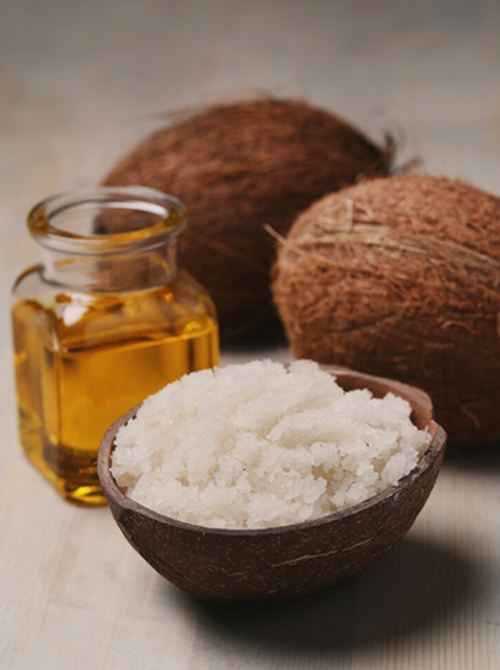
Benefits of Shea Butter for Winter Skincare
As winter approaches, so do skin concerns like dryness, flakiness, and irritation. But thanks to some natural winter moisturizers, you can scale this harsh weather with healthy and supple skin.
Shea butter is a natural fat extracted from the nuts of the shea tree. It offers intense hydration to your skin and, thus, is an excellent remedy for these seasonal skin concerns. Since it is packed with numerous essential nutrients, using shea butter for the skin deeply moisturizes it without leaving a greasy feel.
This article explores the benefits of shea butter for your skin and how you can incorporate it into your winter skincare for dry skin.

Why Does Winter Cause Dry Skin?
In winter, the air is cold and dry, which depletes the natural moisture levels from your skin. Additionally, indoor heating, low humidity, and exposure to harsh winds can further strip away the natural protective oils from your skin. This often weakens your skin barrier, leading to dryness, irritation, and sometimes even cracking of the skin.
In such weather, using rich, hydrating ingredients like shea butter for the skin can restore moisture, strengthen the skin barrier, and shield it against the unforgiving winter elements.
Key Benefits of Shea Butter for Winter Skincare
Known for its incredible moisturizing properties, shea butter offers a host of other benefits that make it a perfect addition to your winter skincare for dry skin.
The following sections discuss the most remarkable benefits of shea butter for your skin.
Deep Hydration for Dry Skin
Shea butter is rich in fatty acids, including oleic, stearic, and linoleic acids. This composition makes it an exceptional natural winter moisturizer. These fats can penetrate the deep layers of your skin and replenish the moisture while simultaneously preventing further water loss.
Rich in Essential Nutrients
Shea butter is packed with essential nutrients, like Vitamins A, E, and F, all of which are vital for your skin’s health. Vitamin A aids in collagen production, thus promoting skin elasticity and reducing fine lines, while Vitamin E is an antioxidant that neutralizes free radicals and protects your skin from external triggers. Vitamin F, also called linoleic acid, nourishes and rejuvenates your skin, making it look more vibrant and healthy.
Protective Barrier Against Winter Elements
Shea butter has a thick and creamy texture. Therefore, it acts as an occlusive that locks in the moisture and prevents external irritants from penetrating your skin. This ingredient also shields your skin against the harsh winter winds and cold temperatures.
Non-Greasy and Lightweight Texture
While intensely hydrating, shea butter has a surprisingly lightweight and non-greasy feel. It gets quickly absorbed into the skin and, thus, is suitable for all skin types, even oily and combination skin.
How to Use Shea Butter for Optimal Winter Skincare
To enjoy the optimal benefits of shea butter for your skin, you must use it the right way. Here are some tips to use shea butter for optimal winter skincare for dry skin:
● Apply it directly to damp skin after a shower to lock in moisture.
● Mix a small amount of shea butter with your regular moisturizer for an extra hydration boost.
● Apply it on dry patches or rough areas like elbows and knees and leave overnight.
Possible Side Effects and Risks
Shea butter is usually safe for all skin types. However, it may trigger minor allergic reactions like redness or itching in some cases. If you have experienced sensitivity to shea butter or have a nut allergy, perform a patch test before proper application. Also, avoid using shea butter in excessive amounts. Since it has a thick texture, it may clog your skin pores, especially if you have acne-prone skin.
Choosing High-Quality Shea Butter for Best Results
To enjoy the optimal benefits of shea butter for your skin and avoid any adverse effects, opt for the high-quality, unrefined, or raw form. Unrefined shea butter still retains most of its natural vitamins and nutrients, imparting superior moisturizing and healing properties.
Look for products with labels mentioning "Grade A" or "100% pure" shea butter. Avoid the commodities that have added chemicals or fragrances, as they may reduce the effectiveness of shea butter and could potentially irritate your skin.
Additional Winter Skincare Tips
To keep your skin supple and healthy in winter, incorporate a deeply hydrating product like Cetaphil Daily Advance Ultra Hydrating Lotion into your winter skincare for dry skin. It contains the goodness of shea butter for the skin, which helps lock in moisture for up to 24 hours, leaving your skin soft and smooth. To ensure optimal skin health, use a gentle cleanser, exfoliate weekly, and apply sunscreen even on cloudy winter days to protect your skin.
Use the Cetaphil AI Skin Analysis Tool for personalized product recommendations based on your skin type.
CONCLUSION
Shea butter for the skin is a highly versatile and effective ingredient to add to your winter skincare. It has deep moisturising properties, contains essential nutrients, and has a lightweight texture which makes it ideal for combating dryness and irritation. So as you gear up for winter, find the best shea butter and incorporate it into your routine to enjoy soft, hydrated skin all winter long.
Frequently Asked Questions (FAQs)
1. What makes shea butter effective for winter skincare?
Shea butter is rich in fatty acids and vitamins A, E, and F, which provide deep hydration and nourishment to your skin. It also creates a protective barrier on your skin to help lock in moisture and shield it against the cold weather, making it a highly effective ingredient for treating dry, flaky skin during winter.
2. Can shea butter help with very dry or cracked skin in the winter?
Yes, shea butter is an excellent agent to treat very dry or cracked skin. It contains fatty acids in high concentrations that penetrate deep into your skin to provide intense hydration. Shea butter also forms a protective barrier, helping to soothe and heal cracked skin.
3. Is shea butter suitable for sensitive skin during colder months?
Shea butter has gentle and non-irritating properties and is usually well-tolerated by sensitive skin. It helps calm inflammation and reduce redness, making it an effective ingredient for sensitive skin during winter. However, it is best to perform a patch test first to prevent any adverse reactions.
4. How does shea butter compare to other moisturizers for winter skin protection?
Shea butter is very different from general moisturizers because it offers a unique combination of deep hydration, essential nutrients, and a lightweight texture. It imparts longer-lasting moisture to your skin and forms a protective barrier, which many water-based moisturizers lack. Shea butter has a natural, non-greasy formula, making it an excellent choice for effective and gentle winter skin protection.











.jpg?sw=450&sh=450&sm=fit&q=85)

